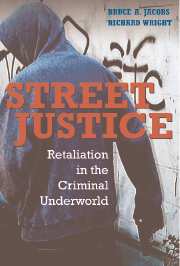Preface
Published online by Cambridge University Press: 05 June 2012
Summary
Admit it. When someone wrongs you, you want to get back at them. Despite Biblical injunctions to turn the other cheek, most of us are reluctant to do so. The urge to get even is so ingrained in the popular imagination that it has spawned a whole genre of Hollywood movies in which a peace-loving hero is driven to avenge the harm done to a loved one in an explosion of pent-up rage. Think of old classics like Death Wish, Billy Jack, or The Outlaw Josie Wales. Such films were popular because they tapped into a deep-seated human desire to see the good deliver justice to the bad, vanquishing evil once and for all.
The real world of retaliation, however, is seldom as neat and clean as Hollywood would have us believe. It often is difficult to distinguish the good guy from the bad guy in disputes that take place beyond the reach of formal law. Short of death, few such conflicts are ever really settled for good, with each new strike generating a counter-strike in a deepening cycle of instability and violence. Indeed, formal law emerged in part to ameliorate the chaos engendered by retaliation, by replacing informal dispute resolution with a more institutionalized mechanism of social control.
Street criminals, however, cannot realistically rely on formal law to settle their disputes. Despite being especially vulnerable to being preyed on, it is difficult for them to stake a legitimate claim to victim status.
- Type
- Chapter
- Information
- Street JusticeRetaliation in the Criminal Underworld, pp. xi - xiiPublisher: Cambridge University PressPrint publication year: 2006

